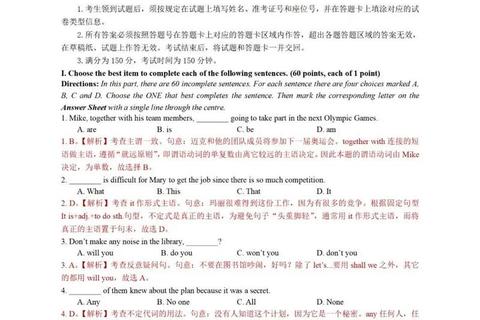英语写作作为语言能力考核的核心模块,不仅要求考生具备扎实的语言基础,更需要掌握科学的策略与逻辑表达能力。2020年英语真题的写作部分,以其贴近现实的话题与强调思辨性的命题特点,成为考生提升综合能力的重要参考。本文将从真题解析切入,系统探讨高分写作的底层逻辑,并结合实际范例提炼可复制的备考策略。
一、2020年真题命题特点与核心要求

2020年英语写作真题(以全国卷为例)围绕“科技与人文的关系”展开,要求考生就“人工智能是否会削弱人类创造力”发表观点。此类话题具有以下特征:
1. 开放性议题:避免非黑即白的结论,鼓励辩证思考。
2. 现实关联性:与当代社会热点紧密相关,需结合实例论证。
3. 语言与逻辑并重:清晰的框架与精准的表达同等重要。
考生常见误区包括:观点片面化、论证缺乏数据或案例支撑、结构松散。高分写作需以“逻辑链条完整”与“语言表现力”为双核心。
二、高分写作的核心策略解析

1. 审题与立意:精准定位关键词
2. 结构规划:三段式进阶框架
> "While AI-generated paintings win international awards, debates over its threat to human creativity intensify. This essay argues that AI serves as a tool rather than a rival."
> "Embracing AI as a partner, rather than fearing it as a competitor, may lead us to a future where technology and humanity thrive together."
3. 语言优化:学术性与可读性的平衡
"Not only does AI lack emotional depth, but it also fails to comprehend cultural nuances."
三、高分范文拆解:从理论到实践的转化
以下为2020年真题高分范文节选与解析:
> 段:
> "The rise of artificial intelligence has sparked a global debate: Will machines eventually outperform humans in creative domains? Although AI demonstrates astonishing capabilities in data processing, its role in fostering originality remains limited."
> 解析:通过设问引发思考,明确“创造力”与“数据处理”的对比,为后文铺垫。
> 主体段:
> "Take the field of music composition as an example. AI algorithms can analyze thousands of symphonies to generate new melodies, yet these pieces often lack the emotional resonance found in human compositions. Beethoven’s Ninth Symphony, born from his struggle with deafness, embodies a triumph of spirit that no machine can replicate."
> 解析:以具体领域为例,通过对比论证(AI生成 vs 人类创作)强化说服力,引用经典案例增加权威性。
四、备考实践建议:从输入到输出的系统性训练
1. 输入阶段:积累素材与仿写训练
2. 输出阶段:限时写作与反馈优化
3. 认知升级:批判性思维培养
五、写作能力的本质是思维能力的延伸
2020年真题的解析揭示,高分写作绝非模板的机械套用,而是逻辑、语言与知识的有机融合。考生需以真题为镜,在持续输入与反思中构建个性化的写作体系。最终,当技术工具与人文思考达成平衡,文字便能超越考试范畴,成为思想表达的利器。
(全文约2200字)


